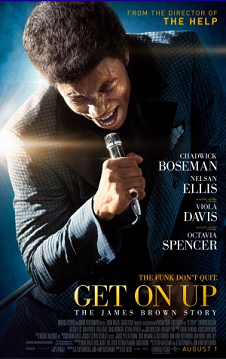"James is
on!" I can still hear my dad yelling across the house whenever
the legendary James Brown would show up on some show, because
dad loved him some James Brown, be it on Johnny Carson or
Midnight Special or Solid Gold or one of the myriad of variety
shows we had on back in the day. Want a quick
education? Go to the You Tube and watch some old
Midnight Specials… all the knowledge you will ever need about
everything. The funny thing about my dad yelling out
about Mr. Brown being on TV was that nobody else in the house
really cared that James was on. What can I tell you, my
mom liked crooners such as Johnny Mathis and Frank Sinatra…
James definitely wasn't that… my older brother was into
whatever was cool back in the late 70's, a little past Mr.
Brown's prime time, I was too young to really care, but always
came to dad's side to keep him company and watch that angry
looking little man do his thing. Now several years after
his death, we have a biopic on the life of James Brown, one
that features some of the best music you will ever want to
hear and an earthshattering performance from Chadwick
Boseman. But do I know more about James Brown than I did
before I saw this movie? Not much, not really.
Director Tate Taylor goes all Quentin Tarantino on us with his
film as he plays with the timeline since the first time we
meet James Brown (Boseman), he looks a little unhinged and
he's holding a shotgun in the middle of some kind of seminar,
mighty upset that someone has dropped a deuce in his
bathroom. James is not in a good place at this moment.
Then our timeline takes us back a bit to little bitty James
Brown and the combustible relationship that existed between
his mom Susie (Viola Davis) and his father Joe (Lennie James),
and it's a wonder how James survived considering these people
that he had for a mom and dad were, to be conservative,
terrible.
The story
will then follow James being abandoned by his mother, dropped
off by his father at a local brothel, getting thrown in jail
for an eleven year sentence for stealing a suit before he is
rescued by a man who will become his benefactor and lifelong
friend, Bobby Byrd (Nelsan Ellis).
It doesn't take long for James to realize that he is one with
the funk, and he and Bobby form a band. As is
unfortunately the case in so many of these creative endeavors
involving groups of people, one person is clearly the star and
the others are just along for the ride, whether they know it
or not, and most recognized, especially James' manager Ben
Bart (Dan Aykroyd) that the other members were not necessary
to be on this ride. Bobby was the only one who stuck
around.
The rest, as they say, is history. James Brown did what
James Brown does. He innovated, he became the Godfather
of Soul, the Hardest Working man in Show Business, he was
unreasonable, unbalanced, a genius, a husband, a father, a
wife abuser, a drug abuser, a shrewd businessman, a sloppy
businessman, tragedy, loss, prison yet again, and
redemption. Maybe. Therein lies our issue with
this otherwise fine film.
There are some things that are very good… even great… about
'Get on Up'. Of course there's the music, but not only
the music itself which didn't need the help of this movie for
us to know that it was great, but the presentation of the
music. The venues, the artists, the choreography… Tate
Taylor almost could've gotten away with simply making this a
dramatized concert film. Then there's the performance
put forth by Chadwick Boseman who literally sets the screen on
fire. At every stage of James Brown's life, Mr. Boseman
convinced me without qualm that he was this character, which I
wasn't convinced going in that Chadwick Boseman, or any actor
for that matter, could pull off. Lennie James and Viola
Davis are typically great in limited support and Tika Sumpter
is in this movie. She doesn't do much… but… you know…
it's Tika Sumpter.
But narratively speaking, 'Get on Up' was literally all over
the place. We are in 1980, then 1940, back to the 80's
then to the 60's then let's stop off at the 50's… I'm not
quite sure what purpose the non-linear time line was serving,
and I would even say that in regards to a movie that many
consider on the best ever in Pulp Fiction… I'm just not sure
what the story telling value is jumping from various points in
time. Also, this movie covers an awful lot of
geographical time in not a lot of actual time, thus cramming
sixty years' worth of anything into a couple of hours can
really only result in a half told story. Almost
everything that is James Brown in this movie, at least as a
person, is glossed over. The abuse, the drug usage, the
marriages, his issues with the family he was half raised by
and the family he helped half raise… It was entertaining to
watch but it was very incomplete. Recognizing for it to
be more complete the movie would have to be about five hours
long, or the filmmakers would have and probably should have
narrowed their time focus.
But the music didn't suffer, that's for sure. And to
that end, this is ultimately a biopic about a man and his
music and thus 'Get on Up', at least on that level was a
rousing success. Great performances, great music,
sketchy narrative… still adds up to a very entertaining film.







